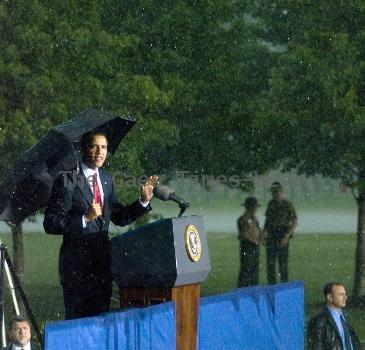Obama relies on straight-talking admiral as face of the federal response to oil tragedy
By Steven R. Hurst, APMonday, June 7, 2010
Adm. Allen: Face of fed’s response to oil tragedy
WASHINGTON — Most times, it’s the president’s coattails that get ridden. But as oil keeps gushing into the Gulf of Mexico, it’s looking more and more as if the White House is riding those of a straight-talking Coast Guard admiral entrusted not only to coordinate the federal response to the nation’s worst environmental tragedy but to keep the administration out of the political muck.
President Barack Obama has been variously criticized for being late to insert himself in the continuing crisis and slow or unable to echo public fury over the April 20 well blowout that killed 11 workers on the Deep Horizon platform that had punched into ocean floor a mile deep.
By choosing Adm. Thad Allen as the crisis manager, Obama has made him the public face of the federal effort. He’s riding herd on BP’s halting attempts to stem the flow of oil and open its coffers to pay billions of dollars for cleanup and economic losses. As hard as that is, Allen’s also charged with trying to contain the millions of gallons of crude oil washing about in the warm Gulf waters.
That’s proving to be a losing battle as wildlife perishes and creeping oil slicks wash into delicate marshlands and stain Gulf beaches.
Allen was one of the few federal officials to improve his reputation during Hurricane Katrina. He won top reviews for his work in managing that crisis, the U.S. response to the Haiti earthquake and the Sept. 11 terrorist attacks of 2001.
Even so, Obama now struggles with a swelling tide of bad news, no matter how deftly he and Allen handle the crisis from here on out.
In the latest Washington Post-ABC News poll, 69 percent of those questioned said the government has done a “not so good” or “poor” job handling the spill. BP got lower marks, with 81 percent of Americans dissatisfied.
As the White House began realizing Americans wanted to see their president doing more — if only symbolically — Obama belatedly put himself in the midst of the crisis with three trips to the Gulf Coast.
One strategic change: Convinced that BP was not giving the public straight answers about failed attempts to plug the leak, and recognizing the political dangers of sharing the stage with the company, the White House public relations team ordered an end to joint briefings with BP two weeks ago. A White House official involved in that decision, who spoke on condition of anonymity because he was not authorized to discuss strategic planning, said Allen presents what the White House believes is “the best chance not to look so bad.”
Allen has become a fixture on television, a seemingly unflappable hand on the tiller who is ready with a chortle or a scowl when needed.
The burly, take-charge character speaks with military precision, does not mince words when talking with or about BP and has, by and large, not sought to sugarcoat what Obama said again on Monday was the country’s worst environmental disaster.
But Allen isn’t exempt from the line of fire. Critics are saying the government did not respond quickly enough, was disorganized and had insufficient resources to start with — echoes of the blow-back that crippled the presidency of George W. Bush after his administration’s flawed response to Hurricane Katrina.
Valid or not, such comparisons must eat at Obama.
The president noted at the end of a Cabinet meeting and briefing by Allen on Monday morning that BP’s so-called top hat capture mechanism was now forcing some of the oil to tankers floating above. But he was unable to sound optimistic.
“Even if we are successful in containing some or much of this oil, we are not going to get this problem completely solved until we actually have the relief well completed,” Obama said, “and that is going to take a couple more months.”
Asked about the oil still heading toward shore, Allen said the massive slick was breaking into hundreds or thousands of small slicks that are tacking in myriad directions along Gulf currents.
“I wouldn’t even say it’s a silver lining because if there’s oil on the water, nothing but bad happens,” he said. “But it does lessen the impact where it does come ashore, because it’s not coming ashore in a mass but it’s coming ashore at a lot of different places.”
When that is the good news from the government man closest to the spill, the president is left with little to do but look forward.
“We will get through this crisis,” Obama said at the Cabinet table, Allen to his left. “It’s going to take some time. It’s not going to be easy. But, you know, this is a resilient ecosystem. These are resilient people, down on the Gulf Coast.”
Allen look on in silence, a man who is approaching retirement and little thought he would be pulled into the maelstrom in his final time on the job.
How does he feel about being the government face of the tragedy?
“I told somebody I’m failing to get fired,” he said with a chuckle. “I’m honored to have been asked to do this. It’s not a very easy job; it’s very complex. It’s one of the hardest things I’ve ever had to deal with personally.”
Associated Press writer Ron Fournier contributed to this report.
Tags: Accidents, Barack Obama, Coastlines And Beaches, District Of Columbia, Emergency Management, Environmental Concerns, North America, United States, Washington



